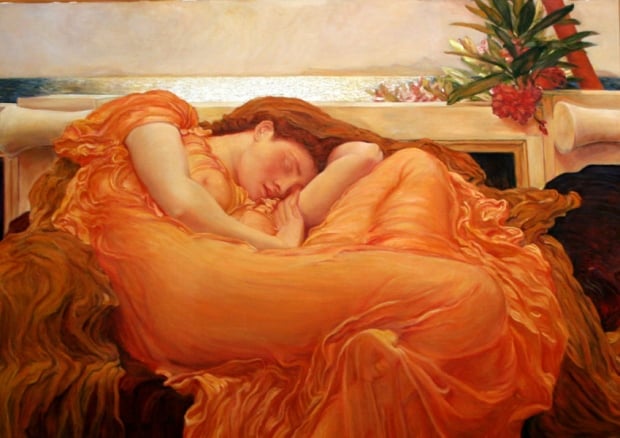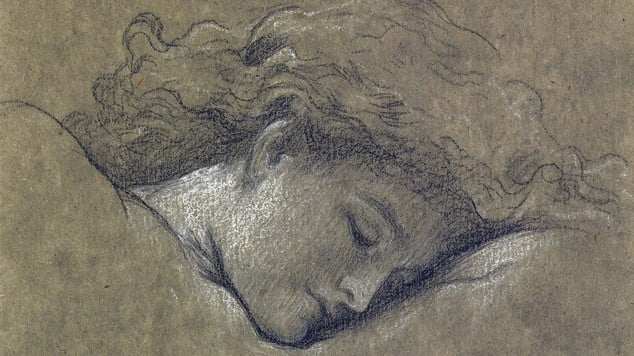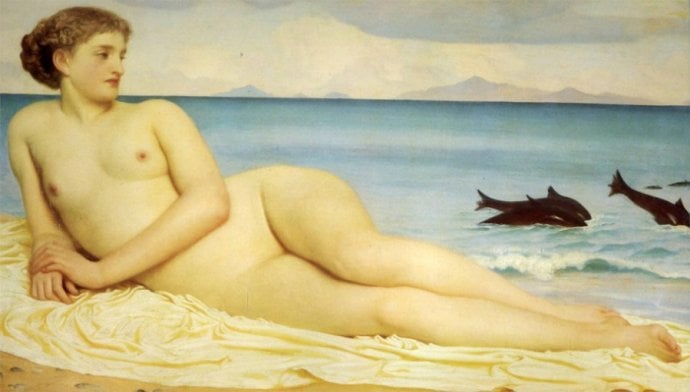Art & Exhibitions
Frederic Leighton’s Lost Study Found Behind Bedroom Door of English Mansion
After being published in a magazine in 1895, it was never publicly seen again.

After being published in a magazine in 1895, it was never publicly seen again.

Sarah Cascone

A study for Frederic Leighton‘s Flaming June, the striking Victorian-era painting of a young woman napping in a flowing orange dress, was found hung behind a bedroom door in a Surrey mansion belonging to the late duchess of Roxburghe, who died this past year at the age of 99 and whose grandfather knew Leighton.
Flaming June, considered by some to be the artist’s masterpiece, is having a bit of a moment. Painted in 1895, the work will have its New York debut at the Frick Collection on June 6 while the rediscovered preparatory drawing for the piece will be auctioned off at Sotheby’s London on July 15 (its pre-sale estimate is £40,000–60,000 [$60,000–90,000]).
Victorian art fell out of favor in the 20th century, and in 1963, a Polish frame maker in London picked up the painting at a market for just £50. From there, the future governor of Puerto Rico purchased Flaming June for $1,000. The painting is on loan to the Frick from the Museo de Arte de Ponce in Puerto Rico.
The chalk and pencil sketch done as a study for the work has an even more obscure history: after being published in a magazine in 1895, it was never publicly seen again. It was found some seven years ago by Sotheby’s Victorian art specialist Simon Toll, during an insurance valuation. The heir to the work is Bamber Gascoigne, Roxburghe’s great-nephew, who arranged for the sale, along with other objects from the house, which he has undertaken the task of restoring.

Frederic Leighton, Flaming June (study) (1895).
Photo: courtesy Sotheby’s, London.
“I immediately realised what it was,” Toll told the Press Association. “It is a thrilling find, one of the most heart-stopping moments of my career.”
The discovery has only just been announced thanks to confidentiality agreements, and the drawing is expected to be among the highlights of the upcoming Victorian, Pre-Raphaelite and British Impressionist Art—just the latest in a string of long lost artworks to have made a splash at auction more recently (see Sotheby’s Ratchets Up Price on Rediscovered John Constable Sketch and Long Lost Masterpiece Discovered in French Attic Comes to Auction).
Despite Flaming June‘s beauty, the piece tends to be divisive: while some critics appreciate Leighton’s technical skills, others consider it kitschy. When it appeared at London’s Tate Britain in 2008, the Independent seemed unwilling to weigh in with a definitive opinion, concluding simply that, rather uniquely, “it is extremely orange.”
“People think of Victorian art as a little bit schmaltzy and pretty,” Toll acknowledged. “But this is not a particularly sentimental picture. It is such a romantic image, it’s almost abstract, there’s no narrative, it’s really about color, pose, and composition.”
Do you think Leighton’s work is schmaltzy and pretty? See a few more of his paintings and decide for yourself:

Frederic Leighton, Actaea, the Nymph of the Show (1868).
Photo: courtesy the National Gallery of Canada, Ottawa.

Frederic Leighton, Mother and Child.
Photo via: WikiArt.

Frederic Leighton, Invocation.
Photo via: Wikimedia Commons.

Frederic Leighton, Greek Girls Picking up Pebbles (circa 1871).
Photo via: WikiArt.

Frederic Leighton, Light of the Harem (circa 1880).
Photo via: Wikimedia Commons.